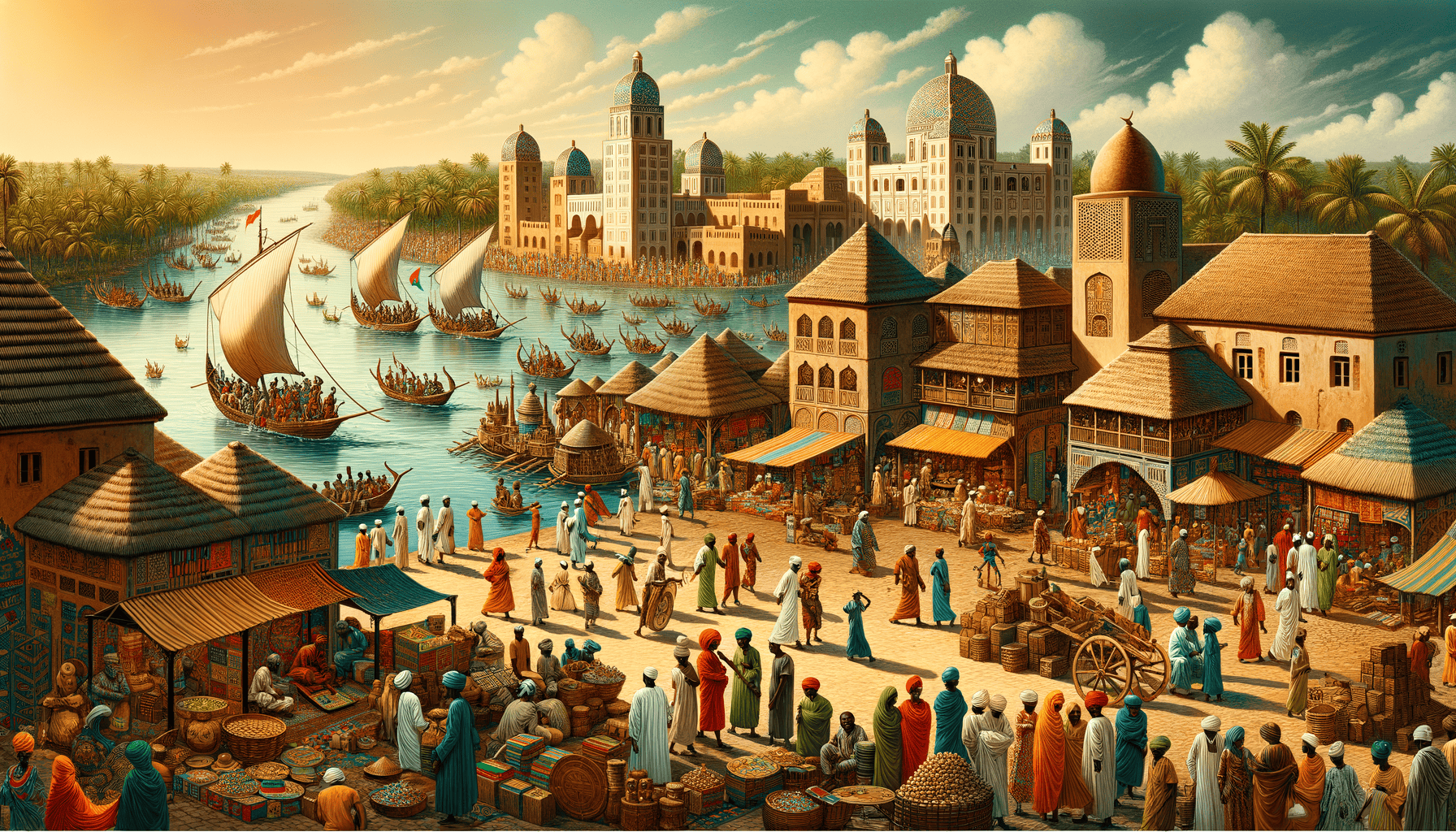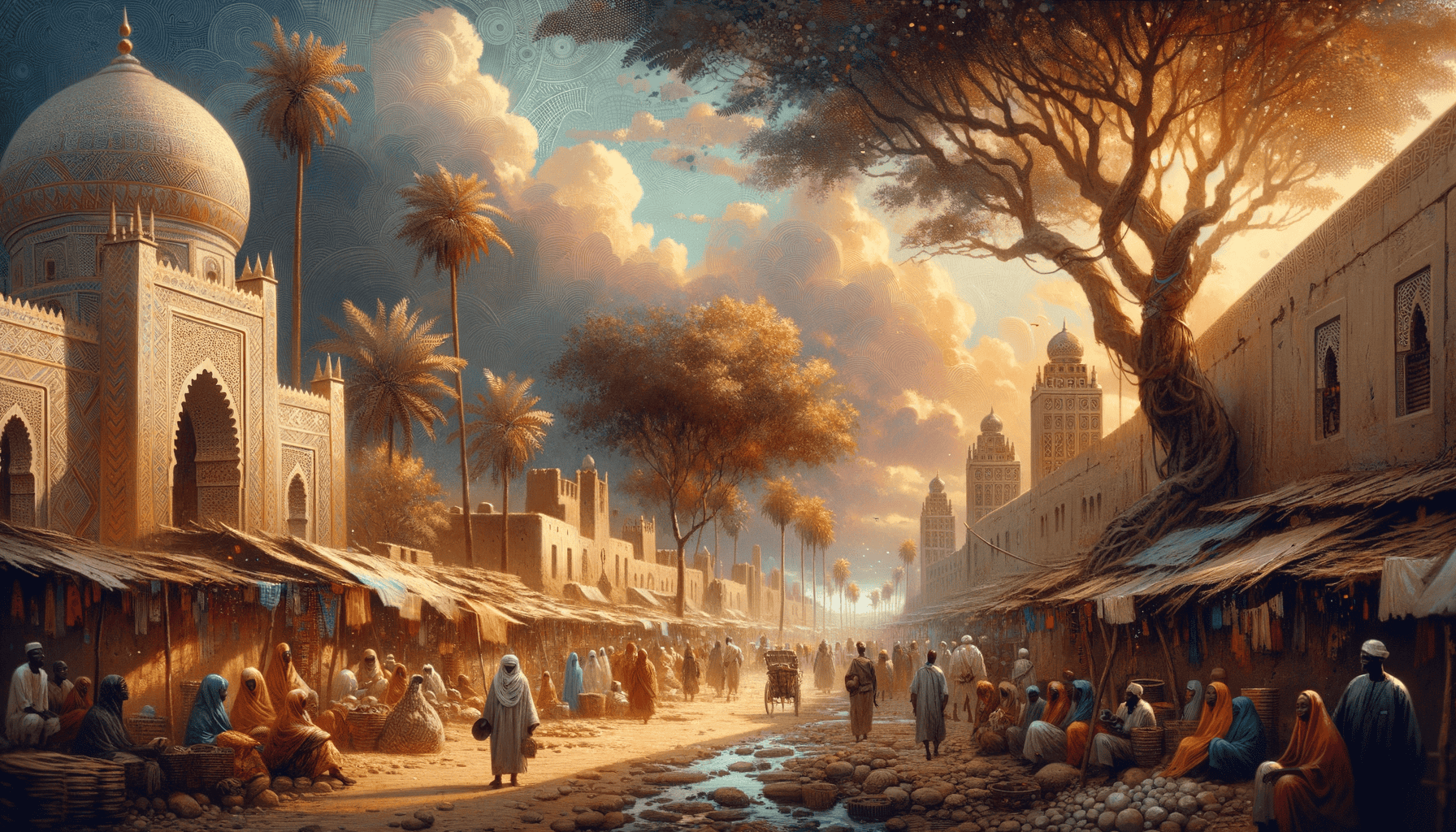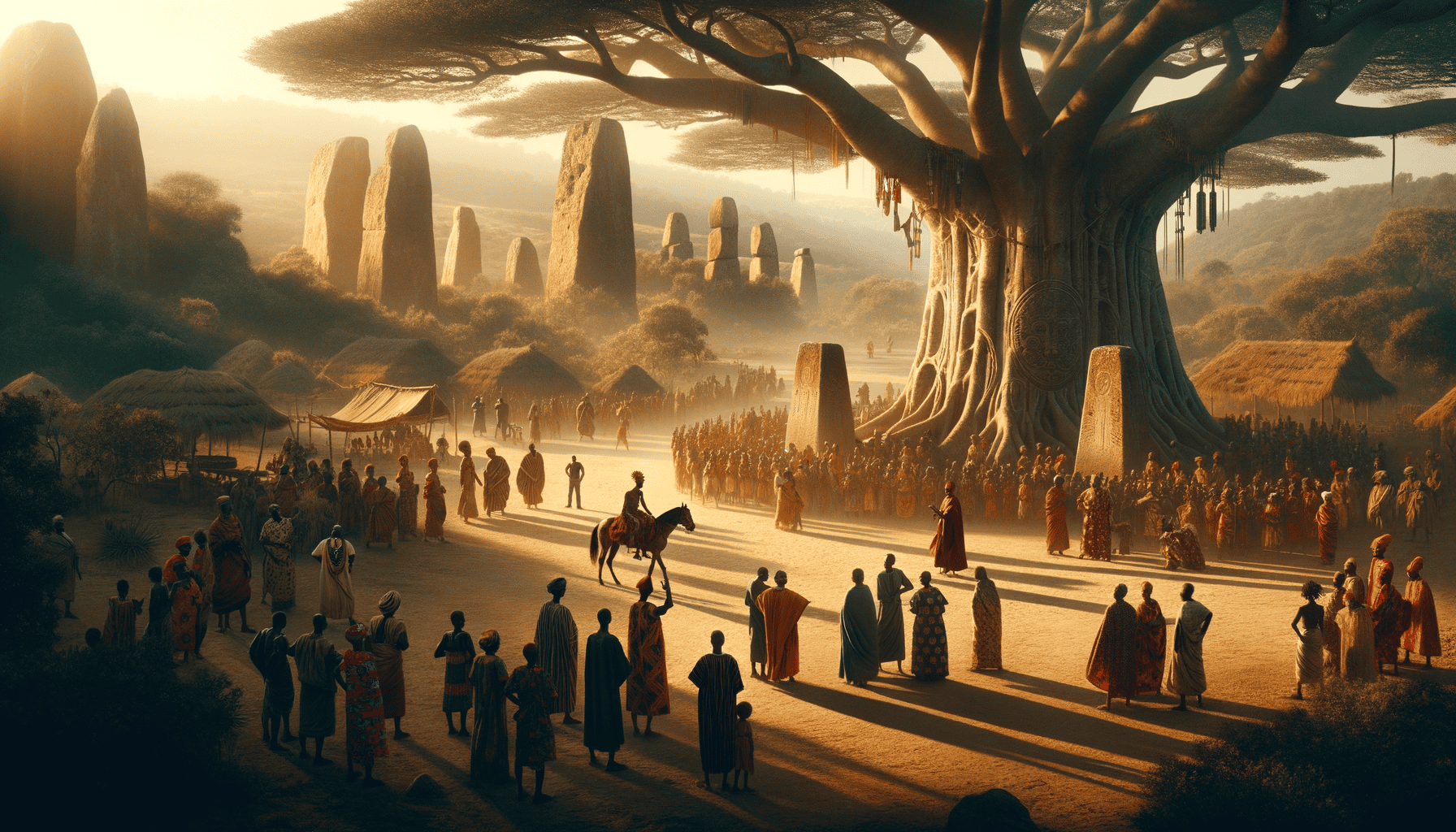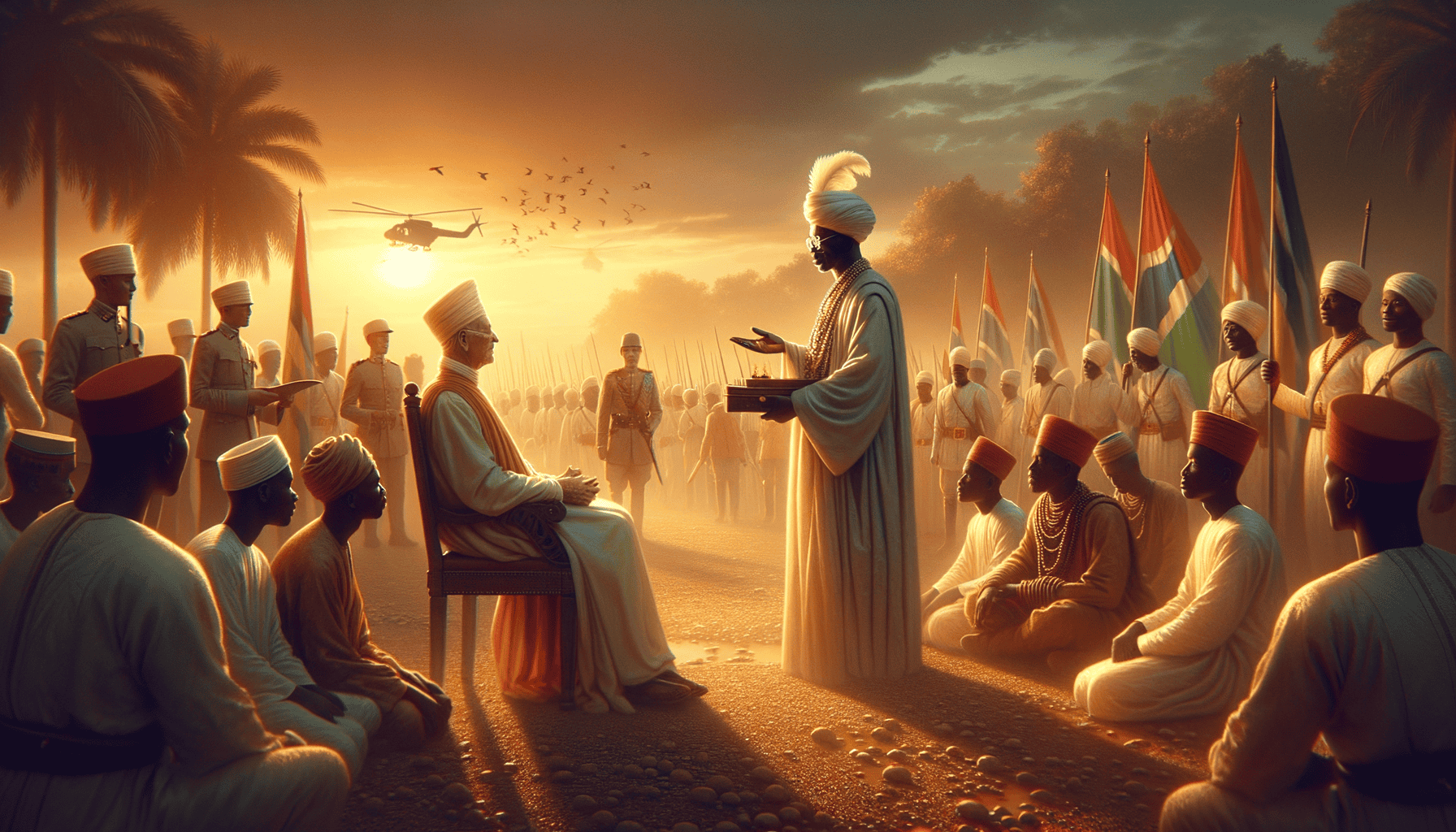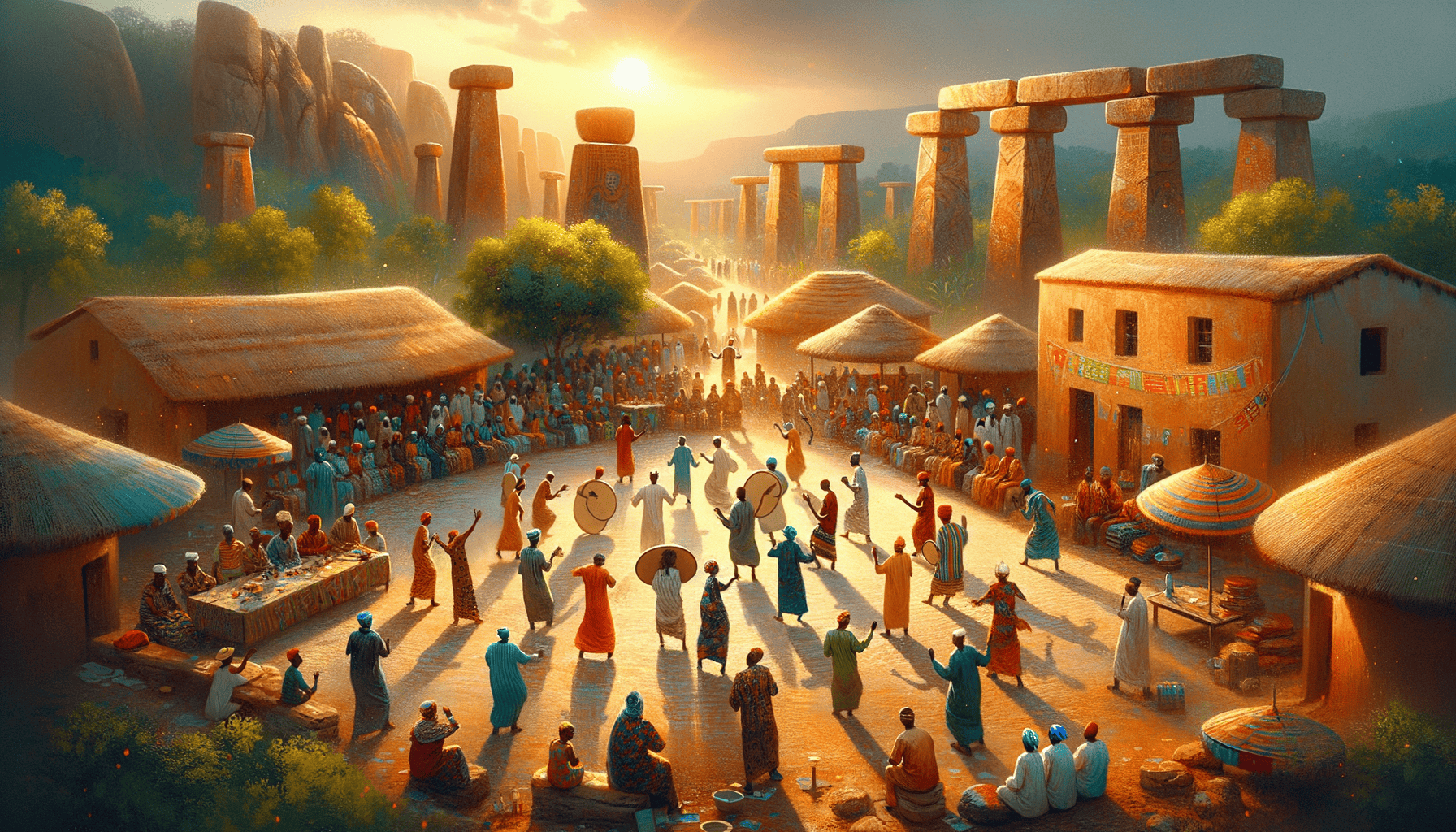Ancient Stones of Wonder
In a special place called The Gambia, there are big stone circles that tell stories from long ago. These stones stand tall and proud in a place called Wassu. They are like giant puzzle pieces from the past!
Little Fatou walks with her grandmother through the stone circles. The morning sun makes the stones glow orange and red. “Why are these stones here, Grandma?” Fatou asks, her eyes wide with wonder.
Grandma smiles and touches one of the smooth stones. "These stones are very old, my dear. Our great-great-great grandparents put them here. They used them to mark special places and tell stories."
The stones stand in perfect circles, like friends holding hands. Some are as tall as grown-ups, while others are shorter than Fatou. Each stone has its own special shape and color.
"But how did they move such big stones?" Fatou wonders, putting her small hand on a cool stone surface.
Grandma explains, "Our ancestors were very clever. They worked together, using ropes and logs to roll the stones. It was like a big game of team work!"
The stones have watched over the land for many years. They have seen:
• Kings and queens walking by
• Traders with gold and salt
• Families having celebrations
• Children playing and learning
The Stones’ Secret Songs
As the wind blows through the stones, it makes soft whistling sounds. "Listen," Grandma says, "the stones are singing their stories."
“When the moon is full and bright, people would gather here to celebrate. They would dance, sing, and tell stories about our people’s history.”
Fatou closes her eyes and imagines the celebrations. She can almost hear the drums beating and see people dancing around the stones.
The stones are like a big history book that we can walk through. They help us remember the smart and strong people who lived here before us.
"Can we come back tomorrow?" Fatou asks, not wanting to leave the magical place.
Grandma nods, "Of course, my dear. The stones will always be here, keeping our stories safe for children like you to learn from."
The sun starts to set, painting the stones in beautiful golden colors. As Fatou and her grandmother walk home, the stones stand silent and strong, ready to share their stories with anyone who comes to visit.
People from all over the world come to see these special stones. They take pictures and learn about The Gambia's old stories. The stone circles remind us that The Gambia has been home to clever and creative people for a very long time.
Like giant picture books made of stone, these circles tell us about the people who lived here long ago. They show us that The Gambia has always been a place of wonder and wisdom.
Golden Age of Trade and Knowledge
The mighty Mali Empire spread across the land like a golden blanket. The Gambia River flowed through its heart like a shiny ribbon.
Young Musa sits by the riverbank, watching boats filled with treasures glide by. His eyes sparkle as he sees traders from far-away lands arrive with their goods.
“Look, Father! What are they bringing today?” Musa points at a big boat loaded with colorful items.
Father smiles, “They bring many wonderful things – salt from the desert, pretty cloth, and shiny gold. Our river is like a road made of water that connects many places!”
• The Gambia River helped people travel and trade
• Boats carried gold, salt, and cloth
• People shared stories and ideas along the river
• Different languages mixed like river streams
A Time of Learning
In the busy town of Juffure, wise teachers shared their knowledge. Children like Musa learned about numbers, stars, and stories from holy books.
Every morning, Musa would join other children under a big tree. Their teacher, Master Fofana, taught them new things each day.
“Knowledge is like gold,” Master Fofana would say, “but even more precious. Gold can be spent, but wisdom stays with you forever.”
Markets Full of Wonder
The marketplace buzzed with excitement. Traders spoke many languages, and their voices mixed like music.
Musa loved helping his father sell cloth in the market. He learned to count coins and speak bits of different languages. People from across the empire came to trade:
– Traders from the desert brought salt
– River folks brought fish and shells
– Forest people brought honey and wood
– Sea travelers brought shells and beads
Stories of Mansa Musa
At night, elders told stories about Mansa Musa, the richest king ever. He gave away so much gold that its value dropped in faraway lands!
“When Mansa Musa traveled, he brought 60,000 people with him! His generosity made our empire famous across the world.”
Rivers of Knowledge
Just like the river carried boats, it also carried knowledge. Scholars wrote books about math, stars, and medicine. They built schools where children learned important things.
Smart people called scholars wrote down stories and facts. They used special paper and ink to save knowledge for future children like you!
Living by the River
The Gambia River was like a kind neighbor. It gave people:
– Fresh water to drink
– Fish to eat
– A way to travel
– Fertile soil for growing food
Musa loved watching the sunset turn the river into liquid gold. “Our river connects us to the whole world,” his father would say. “It brings us not just goods, but wisdom from far away.”
As night fell, Musa dreamed of becoming a wise trader like his father. He wanted to learn all the stories the river could tell, and share them with others.
The Mali Empire showed how trade and learning could make a place great. The Gambia River helped make it all possible, carrying boats, ideas, and dreams along its peaceful waters.
Dark Days of the Atlantic Trade
The warm sun still shone on the Gambia River, but dark clouds gathered over the land. Strange ships with big sails appeared more often.
A Village Changed Forever
In the peaceful village of Juffure, young Sona played near her home. She loved listening to her grandmother’s stories about their brave ancestors.
“Why are people scared of the big ships, Grandma?” Sona asked one evening.
Grandmother’s eyes grew sad. “Those ships bring people who take our friends and family away. They come from across the big water.”
• James Island – where ships stopped
• Kunta Kinteh Island – named after a brave boy
• Albreda – where people were held
• River villages – where families lived
The Story of Kunta
Grandmother told Sona about a brave boy named Kunta Kinteh. He was taken from their village when he was just fifteen years old.
One day, Kunta went to find wood in the forest. Bad men caught him and put him on a ship. He never saw his family again.
Brave Hearts Fight Back
Many people fought against the bad ships. Villages worked together to protect each other. They made special hiding places in the forest.
“Our people never gave up,” Grandmother said. “They were brave and strong. They helped each other and kept hope alive.”
Life Changes
The villages changed during this hard time. People had to:
– Watch for danger all the time
– Hide their children
– Protect their food
– Stay together in groups
Hope Stays Alive
Even in dark times, people found ways to keep their spirits up. They:
• Sang special songs
• Told stories at night
• Kept their traditions
• Helped each other survive
Memories in the Land
Today, special places help us remember this sad time. Kunta Kinteh Island stands as a reminder of brave people who were taken away. ️
Sona touched the old stones on the island. “These stones tell sad stories,” she said. “But they also show how strong our people were.”
Learning from the Past
Grandmother hugged Sona tight. “We tell these stories not to make you sad, but to help you understand how brave your family was.”
The river still flowed, carrying memories of both happy and sad times. People like Sona learned about their past to build a better future.
Every evening, as the sun set over the river, villages remembered their lost loved ones. They kept their stories alive, passing them down like precious treasures from one generation to the next.
The Gambia would never forget this time, but the strength of its people would help heal old wounds and build new hope.
Standing Strong Together
The sun rose over the Gambia River, bringing new hope. People were tired of others telling them what to do. It was time for change!
Brave Leaders Rise
In villages along the river, new leaders spoke up. They had big dreams of freedom. One of these leaders was Mama Jarra.
“We must teach our children our own ways,” Mama Jarra said. “Our stories, our songs, our dances – these make us who we are.”
Children gathered around her, eager to learn. She taught them old songs and stories that their grandparents knew.
Secret Meetings
At night, people met in hidden places. They talked about making their own choices. They wanted to:
• Speak their own languages
• Farm their own land
• Make their own rules
Keeping Culture Alive
Young Malik loved learning about his people’s ways. His father taught him to play the kora, a special string instrument.
“When we play our music,” his father said, “we keep our spirit strong. No one can take that from us.”
Working Together
Villages joined hands to help each other. They shared:
– Food from their farms
– Medicine from plants
– Stories and songs
– Hope for tomorrow
Speaking Up
More people started to speak up against unfair rules. They wrote letters and held peaceful meetings. Some even went to big cities to talk to important people.
“We want to be free,” they said. “We want to choose our own path.”
Growing Stronger
Young people like Malik learned new things while keeping old traditions. They went to school but also learned from village elders.
One day, Malik stood up in front of his village. He played the kora and sang a new song about freedom. Everyone joined in!
Changes Begin
Slowly, things started to change. People saw that standing together made them strong. They weren’t afraid anymore.
In markets and meeting places, people talked about building their own country. They dreamed of a place where everyone could be happy and free.
Looking Forward
Mama Jarra smiled at the children around her. “We are like the mighty river,” she said. “We keep flowing forward, getting stronger every day.”
The old ways and new ideas came together. People found strength in their roots while reaching for new dreams.
Every evening, as families gathered to share meals, they felt hope growing. Their voices were getting louder. Their steps were getting bolder.
The path to freedom wasn’t easy, but the people of Gambia were ready. They knew that by standing together, they could make their dreams come true.
The river watched as its people grew stronger. Change was coming to the land of the smiling coast.
Dreams of Freedom
The year was 1962. A tall man named Dawda Jawara stood before a crowd. His eyes sparkled with hope.
A New Leader
Dawda Jawara was different from other leaders. He didn’t want to fight. He wanted to talk and make friends. People loved him because he listened to everyone.
“We can build our own country,” Dawda said. “We can do it with peace in our hearts.”
Making Plans
Little Fatou watched as her parents talked about change. They were excited!
“Soon we will have our own flag,” her mother said. “Our own songs. Our own way.”
• Good schools for children
• Better farms and markets
• Hospitals for sick people
• Happy homes for families
Building Together
Everyone helped get ready for independence. Women made colorful clothes with the new flag colors. Men built new schools. Children learned new songs about freedom.
Fatou and her friends practiced a special dance. They would perform it on the big day when Gambia became free!
Hard Work Ahead
Making a new country wasn’t easy. There was so much to do:
– Train new teachers
– Build roads
– Start businesses
– Help farmers grow more food
Help from Friends
Other African countries helped Gambia. They shared:
“We are all brothers and sisters. When one of us stands up, we all stand taller.”
Getting Ready
The big day was coming! People cleaned their houses and streets. They practiced new songs. Everyone wanted everything to look perfect.
Dawda Jawara worked hard too. He talked to many people about how to make Gambia strong and free.
A Special Day
Finally, on February 18, 1965, the sun rose on a new Gambia. Fatou woke up early. She could hear music in the streets!
People danced and sang. They raised their new flag high. Red for the sun, blue for the river, green for their farms, and white for peace.
New Beginnings
That night, Fatou’s grandmother told stories under the stars. ⭐
“Remember this day, little one,” she said. “Today we became free to write our own story.”
Gambia was now its own country. People faced hard work ahead, but they were ready. They had big dreams and brave hearts.
The river flowed on, watching as its people took their first steps as a free nation. The future was bright with promise.
A Nation’s Pride
The sun shines bright over modern Gambia. Children play near the sparkling river, just like their great-grandparents did. But now, they have many new stories to tell!
A Special Place
Today’s Gambia is full of happy faces. That’s why people call it “The Smiling Coast.” In the busy streets of Banjul, the capital city, you can hear many languages and songs.
“Our different voices make one beautiful song,” says Aisha, a young teacher. “Just like a rainbow needs all its colors.”
Growing Together
New schools pop up like flowers after rain. Children learn about computers and space, but they also learn their grandparents’ wisdom.
• Beautiful beaches where tourists come to play
• Friendly people who help each other
• Tasty foods like domoda and benachin
• Amazing music and dance shows
Protecting Nature
Gambians work hard to keep their land beautiful. They plant trees and protect animals. In the river, hippos splash happily. In the sky, colorful birds sing.
“The earth is like our mother,” explains Omar, a park ranger. “We must take good care of her.”
Sharing Stories
Every evening, families gather to share tales. Some stories are very old, about the stone circles and ancient kings. Other stories are new, about brave people who helped make Gambia free.
“When we tell stories,” says Grandma Fatou, “we keep our history alive in our hearts.”
Dreams for Tomorrow
Young Gambians have big dreams. They want to:
– Be doctors and teachers
– Make movies about their country
– Help poor people
– Keep their culture strong
Working Together
Everyone helps make Gambia better. Women run businesses. Farmers try new ways to grow food. Artists paint beautiful pictures.
Even little children do their part by keeping their schools clean and being kind to others.
A Bright Future
The ancient stone circles still stand tall, watching over the land. They have seen Gambia grow from old kingdoms to a new nation.
The river still flows, carrying boats full of dreams. Some things have changed, but the most important things stay the same: the warm hearts of the people, their love for their land, and their hope for tomorrow.
“Our story isn’t over,” says a young student named Malik. “We’re still writing it together, every day.”
Forever Home
As the sun sets over the Smiling Coast, children dance on the beach. Their feet make patterns in the sand, like the footsteps of all who came before them.
The Gambia has grown from ancient mysteries to golden kingdoms, through dark times to bright freedom. Now it stands proud, a small country with a big heart, ready for whatever tomorrow brings.
And so, the story of the Smiling Coast continues, written by brave hearts and smiling faces, flowing like the mighty river toward a future full of hope. ❤️


